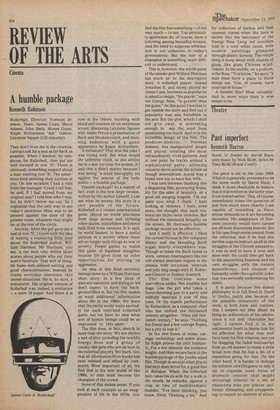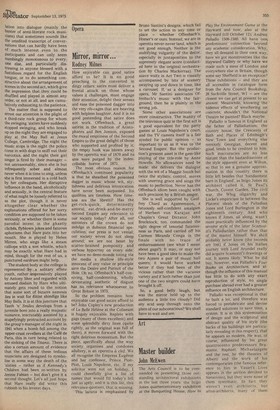Theatre
Past imperfect
Kenneth Ruffen
Teeth 'n' Smiles by David Hare, with music by Nick Bicat, lyrics by Tony Mal (Royal Court)
The piece is set in the year 1969. While it is generally presumed to be the latest work by David Hare, I think it more charitable to believe that it was written in the same year, if not indeed earlier. This, of course, immediately raises the question of just how much more charity I am capable of extending to Hare, whose demands on it are becoming excessive. His adaptation of Fanshen! recently would have turned me off most dramatists forever, but in his case forgiveness ensued from the reflection that if he had this terrible urge to instruct us all in the struggles of the Chinese peasantry, it was as well to have it over and done with. He could then get back to the playwriting business and his own struggles with the natural misanthropy, and despair of humanity under the capitalist yoke, that was seriously undermining his talent.
It is partly because this dismal philosophy is in full flood in Teeth 'n Smiles, partly also because of the palpable immaturity of the work, in both form and content, that I suspect my idea about its being an indiscretion of his adolescence is not only charitable but right. I cannot find it in my sentimental heart to blame him for his affection for what may well have been his first creation, nor yet for dragging the faded manuscript from an old drawer to make a little bread now that he has a bit of a reputation going for him. On the other hand, it is harder to indulge his indolent unwillingness to tidy it up; to organise some focus of dramatic tension that might encourage interest in a set of characters who are almost uniformly dismaying and unappetising; to import an element of stimu lation into dialogue (mainly the banter of semi-literate rock musicians) that sometimes sounds like the unedited transcript of conversations that can hardly have been of much interest even to the Participants and can only seem numbingly monotonous to everyone else, and particularly distressing to anyone blessed with a fastidious regard for the English tongue; or to do something constructive about the arrangement of scenes in the second act, which give the impression that they could be shuffled and played in almost any order, or not at all, and are cumulatively exhausting to the patience.
The matter that is supposed to arrest our attention is the plight of a third-rate rock group for whom the swinging 'sixties have suddenly stopped swinging, and who break Upon the night they are engaged to play at the May Ball at Jesus College, Cambridge. The night the music stops is the night the police come in with dogs to sniff out their narcotics, and the night their girl singer is fired by their manager — not unreasonably, since she is but infrequently sober and almost never when it is time to sing, unless she is first immersed in a cold bath by her colleagues. Her disruptive influence in. the band, alcoholically and sexually, is the central feature of what might be loosely referred to as the plot, though it is never altogether clear whether the explanations offered for her sorry condition are supposed to be taken seriously, or whether there is some parodial intent in the ghastly clichés, flyblown jokes and fatuous aphorisms that Hare puts into her mouth. She is played by Helen Mirren, who sings like a steam calliope with a wet whistle, which may be exactly what Hare had in mind, though for the rest of us, a punctured eardrum might help.
The student body at the college is represented by. a solitary effete youth, rather impressively played by Antony Sher and regarded with amused disdain by Hare who ultimately gets round to the notion that some sort of bizarre nemesis lies in wait for elitist shindigs like May Balls. It is at this juncture that Teeth 'n' Smiles develops from a juvenile bore into a really majestic nuisance, inscrutably assisted by a stupefyingly protracted account by the group's manager of the night in 1941 when a bomb fell among the upper-crust revellers at the Café de Paris, this in turn being related to the sinking of the Titanic. There is also a certain amount of evidence that the affairs of these tedious musicians are designed to symbolise in some way the death of the 'sixties — rather as if Kennedy's Children had been re-written by Jennie Fabian — but don't give it a second thought. Let's all just hope that Hare really did write this rubbish in his leveret days.



































 Previous page
Previous page